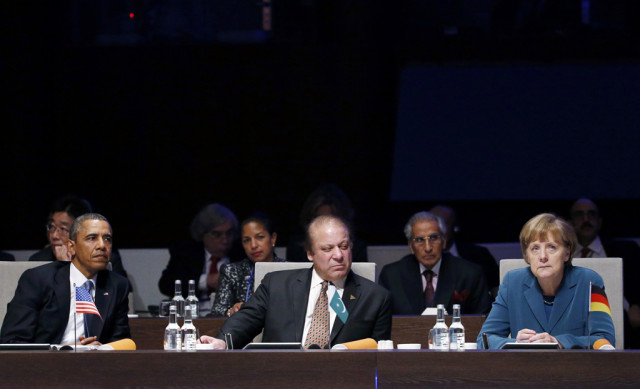Pursuing civil nuclear energy
We welcome PM’s address at Hague where he aired Pakistan’s legitimate demand for access to civil nuclear technology.

US President Barack Obama, Pakistan's Prime Minister Nawaz Sharif and Germany's Chancellor Angela Merkel (L-R) attend attend the opening session of the Nuclear Security Summit (NSS) in The Hague March 24, 2014. PHOTO: REUTERS

The assembled worthies from around the globe listened to a well-argued and persuasive speech in which the prime minister pointed to the fact that Pakistan has a 40-year experience of running a safe, secure and safeguarded civil nuclear programme. The country, he noted, has the expertise, manpower and infrastructure to produce civil nuclear energy. As the Netherlands moot was principally concerned with nuclear safety, he allayed the world’s anxieties about how Pakistan handles its nuclear assets. He assured the conference delegates that his country attaches the highest importance to nuclear security “because it was directly linked to the country’s national security”.
We welcome the prime minister’s address at an important world forum where he aired Pakistan’s legitimate demand for access to civil nuclear technology. This is in keeping with the dire energy situation that we face today. It hardly needs a mention here that the US has already accorded India a similar deal. In order to achieve this goal, we need to keep assuring the international community that any such deal will only be used strictly for civilian purposes and that our nuclear assets are secure and well protected. It is well worth recalling that when US Secretary of State John Kerry visited Pakistan in August 2013, he himself suggested that Islamabad and Washington consider cooperation in civil nuclear technology to meet the former’s energy needs. Let’s hope that we see that happen soon.
Published in The Express Tribune, March 26th, 2014.
Like Opinion & Editorial on Facebook, follow @ETOpEd on Twitter to receive all updates on all our daily pieces.














COMMENTS
Comments are moderated and generally will be posted if they are on-topic and not abusive.
For more information, please see our Comments FAQ